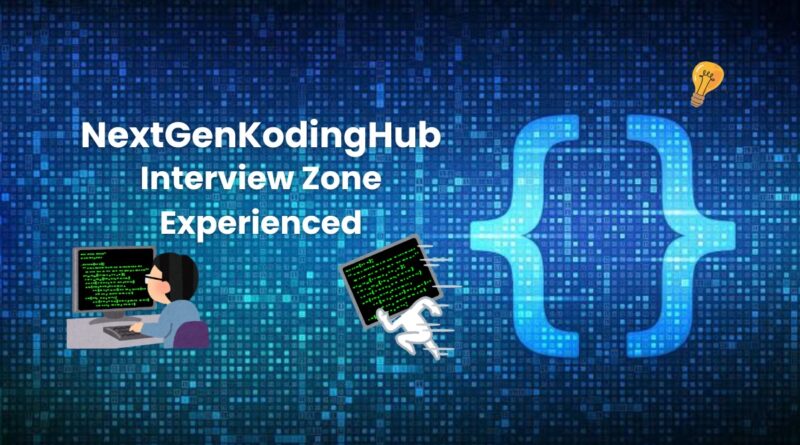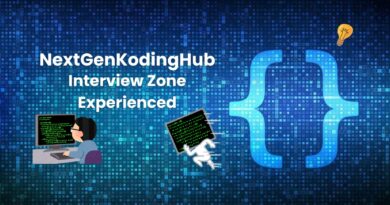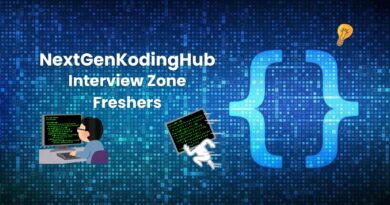Resume-Based Questions for Experienced
Interview Focus: Resume-Based Questions for Experienced Professionals
Resume-Based Questions for Experienced: Essential Interview Preparation Guide
When preparing for technical interviews, Resume-Based Questions for Experienced candidates are a critical component. Interviewers extensively review your resume to tailor questions around your professional background, projects, skills, and achievements. Answering these questions effectively demonstrates your expertise and relevance for the role.
This comprehensive guide covers over 30 frequently asked Resume-Based Questions for Experienced professionals. Alongside each question, detailed tips and strategies are provided to help you articulate your experiences clearly and confidently during interviews.
1. Can you walk me through your resume?
This question is almost always asked. Provide a concise summary of your professional journey, focusing on roles, responsibilities, key achievements, and skills. Highlight experiences relevant to the position you’re interviewing for.
2. Why did you leave your previous job?
Answer honestly but diplomatically. Focus on seeking new challenges, growth opportunities, or alignment with your career goals. Avoid negative remarks about former employers.
3. Describe a challenging project you worked on from your resume.
Pick a significant project, explain its goals, your role, challenges faced, and how you overcame them. Discuss technologies used and the impact of the project on the business.
4. What technical skills listed on your resume do you feel most confident in?
Highlight skills where you have deep expertise. Provide examples of projects or tasks that demonstrate your proficiency in these technologies or methodologies.
5. Can you explain the gaps in your employment history?
Be honest about any gaps and use them to show how you stayed productive — through learning, freelancing, certifications, or personal projects.
6. You mentioned experience with [Technology/Tool] on your resume. Can you elaborate?
Prepare detailed explanations and examples that show your practical use of the technology or tool, including challenges and results.
7. How did your role evolve in your last job?
Discuss how your responsibilities expanded or changed, new skills learned, and leadership opportunities taken.
8. What was the biggest accomplishment listed on your resume?
Choose an achievement that had measurable impact. Quantify your results wherever possible to add credibility.
9. Tell me about your experience working in a team environment.
Share specific instances of collaboration, conflict resolution, and teamwork. Emphasize communication skills and the ability to work effectively with diverse groups.
10. Can you describe a time when you had to learn a new skill quickly for a project?
Highlight your adaptability and eagerness to learn. Explain the learning process, application, and outcomes.
11. What leadership experience do you have as mentioned on your resume?
Describe leadership roles, including managing teams, mentoring juniors, or leading projects. Focus on your leadership style and results.
12. How do you prioritize tasks in your projects?
Explain your approach to time management, task prioritization, and use of tools or methodologies like Agile or Scrum.
13. What’s the most complex problem you solved at work?
Detail the problem, your analysis, the solution, and its impact. This shows problem-solving and critical thinking skills.
14. You listed certifications on your resume; how have they helped you professionally?
Discuss how certifications enhanced your knowledge, skills, and contributed to your job performance or career growth.
15. How do you stay updated with industry trends?
Mention blogs, courses, seminars, networking, or other continuous learning methods.
16. Can you discuss your experience with project management mentioned in your resume?
Share details on managing timelines, resources, risks, and communication with stakeholders.
17. Tell me about a failure or mistake at work and how you handled it.
Be candid, focusing on what you learned and how you improved processes or prevented future issues.
18. What motivated you to take the career path described in your resume?
Share your passion, goals, and experiences that shaped your career choices.
19. How do you handle feedback or criticism at work?
Emphasize your openness, learning attitude, and examples where feedback led to improvement.
20. Describe your experience working under tight deadlines.
Provide examples of time-sensitive projects, how you managed pressure, and still delivered quality results.
21. What’s the biggest challenge you faced transitioning between roles or companies?
Explain differences in technology, culture, or responsibility and how you adapted successfully.
22. Can you describe your experience with mentoring or training others?
Highlight your role in knowledge transfer, onboarding, or coaching colleagues.
23. How have you contributed to process improvements in your past jobs?
Share specific examples where you identified inefficiencies and implemented better practices or automation.
24. What tools or technologies do you prefer and why?
Discuss your preferences backed by practical experience and how these tools helped achieve project goals.
25. Explain a project where you took initiative beyond your regular responsibilities.
Show your proactive attitude, leadership, and impact on team or project success.
26. Can you talk about your cross-functional collaboration experience?
Discuss working with product managers, designers, QA, or other teams and how you ensured project alignment.
27. How do you manage conflicting priorities or requests?
Explain negotiation skills, stakeholder communication, and prioritization strategies.
28. What’s your approach to debugging or troubleshooting complex issues?
Detail your systematic process, tools used, and how you document and resolve problems.
29. Describe your experience with code reviews or quality assurance.
Explain your involvement in reviewing code, ensuring standards, and providing constructive feedback.
30. How do you handle changes in project scope or requirements?
Discuss flexibility, communication with stakeholders, and impact analysis.
31. How have you balanced multiple projects or responsibilities simultaneously?
Provide examples of effective multitasking, delegation, and prioritization.
32. Can you share an example of how you improved team productivity or morale?
Discuss initiatives, mentorship, or activities that positively influenced your team.
33. What’s your experience with remote work or distributed teams?
Explain communication tools used, challenges faced, and how you maintained productivity.
34. How do you ensure your work aligns with business objectives?
Talk about understanding stakeholder goals, impact measurement, and aligning deliverables.
35. What are your salary expectations and how does your experience justify them?
Be realistic, research market rates, and confidently relate your experience and value to compensation.
Final Tips for Answering Resume-Based Questions for Experienced Professionals
Always tailor your responses to the job description and company culture. Use the STAR (Situation, Task, Action, Result) method to structure answers clearly. Practice delivering your experiences naturally and confidently to leave a strong impression.



